Centre, SC Favour Live-Streaming of Court Proceedings
Supreme Court has asked Attorney-General to frame guidelines on live-streaming of court proceedings

On Monday, 9 July, the Supreme Court of India agreed in principle to allow live-streaming of court proceedings (except in-camera cases, rape cases and matrimonial disputes) after Attorney-General KK Venugopal indicated that the Centre was in favour of the idea.
The bench comprising Chief Justice Dipak Misra and Justices AM Khanwilkar and DY Chandrachud asked the parties to give suggestions to the Attorney-General for formulating holistic guidelines for live-streaming of court proceedings.
The apex court had, on May 3, sought the response of the Centre on pleas seeking live-streaming, video recording or transcribing of judicial proceedings in courts. The petitions had been filed by senior advocate Indira Jaising (who argued that citizens had the right to know what was happening in the courts, and that this would prevent misreporting) and law student Swapnil Tripathi (who had also argued for better access for legal interns).
Live-Streaming is “Need of the Hour”: SC
Venugopal said in court that there would be many benefits to allowing live-streaming, including ensuring discipline in court proceedings and giving people from remote areas, who cannot visit the courts, a chance to observe legal proceedings. He also agreed that live-streaming would be useful for interns and law students.
Venugopal, representing the Union Government, suggested that all court proceedings should be live-streamed, not just matters confined to Constitution Benches at the Supreme Court. He qualified this by saying that the courts should have the discretion to omit any part of the proceedings.
Terming the move to be the “need of the hour”, the bench said that it should be implemented promptly. It is not yet clear whether a separate TV channel will be set up to broadcast proceedings, or whether this will be streamed online – the court asked petitioners to submit their suggestions to the the A-G so that his office can come up with holistic guidelines for this.
The matter will be heard next on 23 July 2018.
(With inputs from PTI.)
(At The Quint, we are answerable only to our audience. Play an active role in shaping our journalism by becoming a member. Because the truth is worth it.)